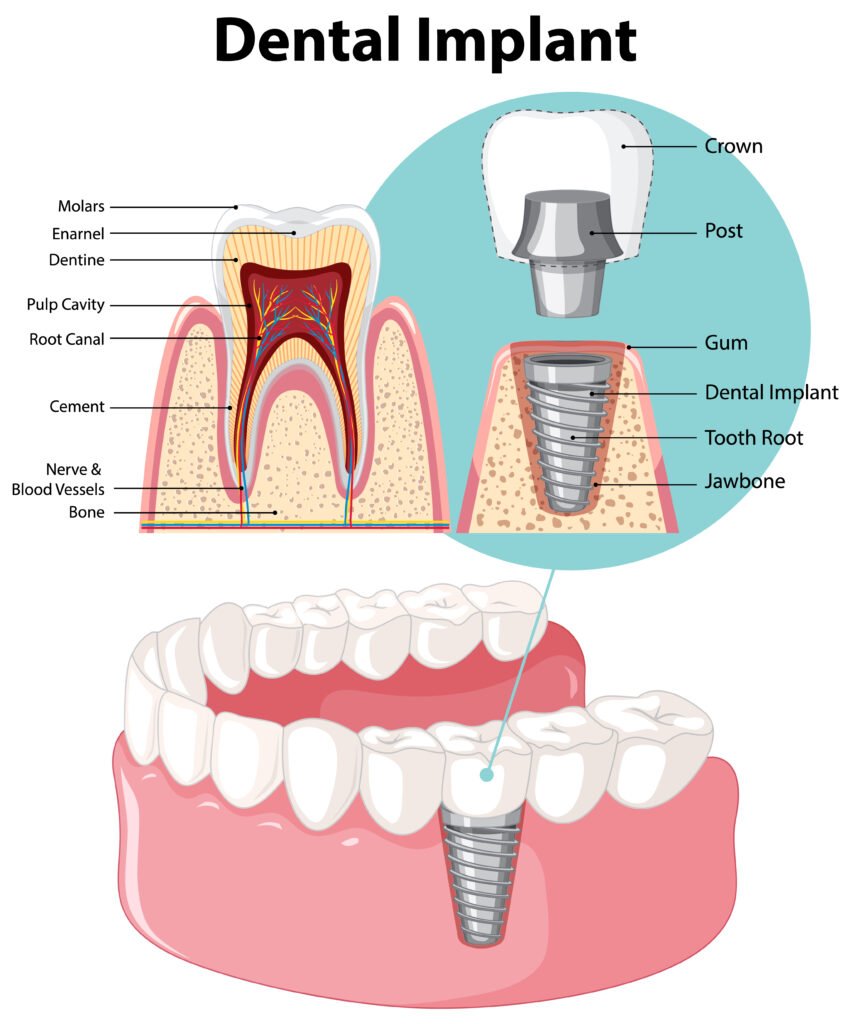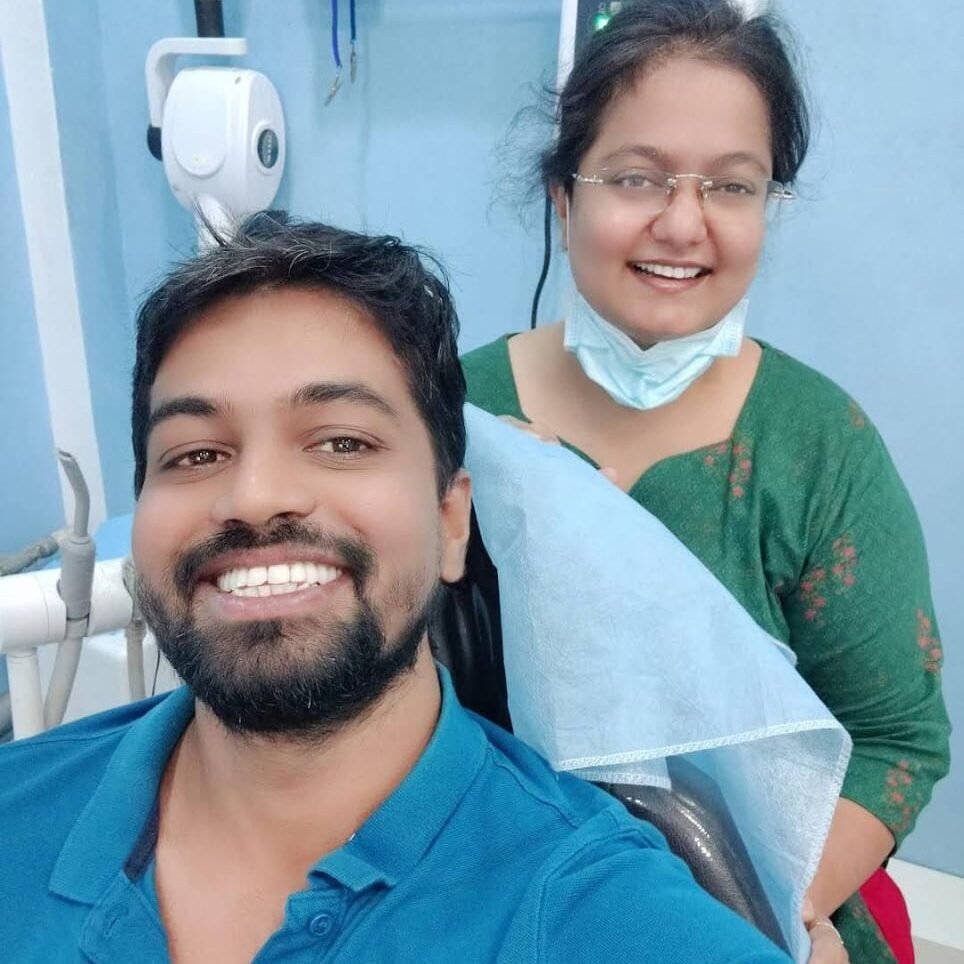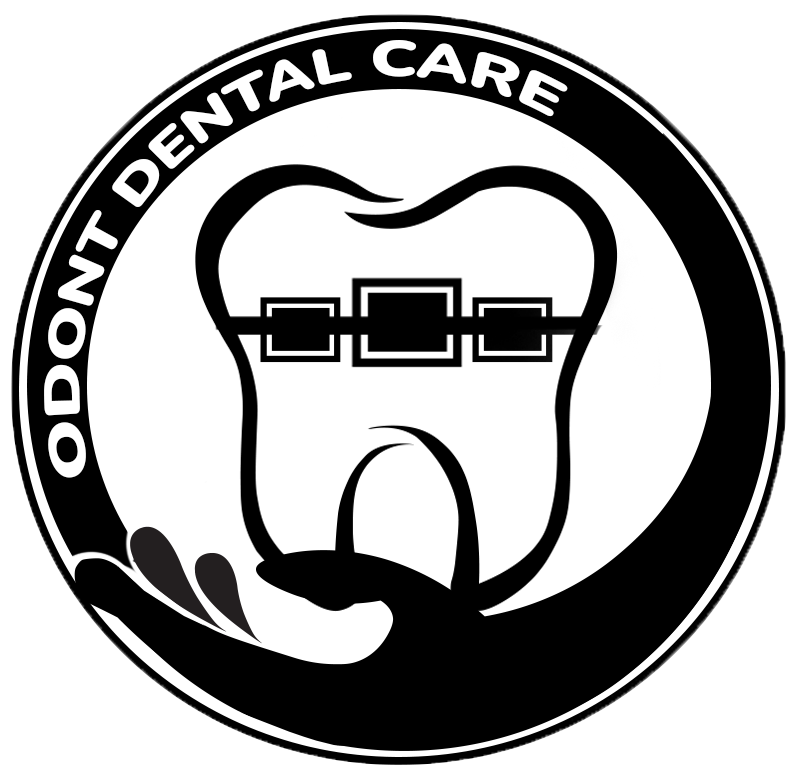
Book An Appointment Today
What is a Dental Implant?
A dental implant is essentially an artificial tooth root surgically inserted into the jaw to provide support for a prosthetic tooth or bridge. Typically, when people refer to “dental implants,” they are encompassing both the implant (the synthetic tooth root) and the accompanying prosthetic tooth. This innovative solution is often considered for individuals who have lost teeth due to various reasons, such as periodontal disease, injury, or other factors, and wish to avoid the use of dentures.
At Odont Dental Care in Bangalore, we specialize in offering comprehensive dental implant services. Our experienced team provides personalized care to those seeking effective and long-lasting solutions for tooth replacement. Whether you have lost a single tooth or multiple teeth, dental implants can restore both function and aesthetics, contributing to a natural-looking and comfortable smile.
Types of Dental Implants:
Endosteal Implants:
- These are the most common types of dental implants.
- Surgically placed directly into the jawbone.
- Typically made of titanium, which is biocompatible and fuses well with the bone.

Subperiosteal Implants:
- Placed on top of the jawbone but beneath the gum tissue.
- Suitable for patients with insufficient bone height or those who cannot undergo a bone augmentation procedure.

All-on-4 and All-on-6 Implants:
- Placed on top of the jawbone but beneath the gum tissue.
- Suitable for patients with insufficient bone height or those who cannot undergo a bone augmentation procedure.

The Dental Implant Treatment Process:
1. Consultation and Assessment:
Begin your journey to a new smile with a comprehensive consultation. The dentist will assess your oral health, take X-rays, and discuss your goals to determine if dental implants are the right option for you.
2. Treatment Planning:
Based on the assessment, a customized treatment plan is created. This plan outlines the number of implants needed, the type of restoration (crown, bridge, or denture), and the timeline for the procedure.
3. Implant Placement:
During the surgical procedure, the implants are precisely placed into the jawbone. This process is often performed under local anesthesia, ensuring a comfortable experience.
4. Osseointegration:
The healing phase begins as the implants fuse with the jawbone through a process called osseointegration. This typically takes a few months and is crucial for the stability and success of the implants.
5. Abutment Placement:
Once osseointegration is complete, abutments (connectors) are attached to the implants. These abutments serve as the support structure for the final prosthetic teeth.
6. Prosthetic Attachment:
Finally, custom-made crowns, bridges, or dentures are securely attached to the abutments, completing your smile transformation. The end result is a natural-looking and functional set of teeth that blend seamlessly with your existing dentition.
Benefits of Dental Implants:
Enhanced Functionality:
Dental implants restore natural chewing ability, allowing you to eat your favorite foods without discomfort or limitations.Dental implants restore natural chewing ability, allowing you to eat your favorite foods without discomfort or limitations.
Aesthetic Perfection:
These implants seamlessly blend with your natural teeth, offering a visually appealing and natural-looking smile that boosts confidence. Dental implants restore natural chewing ability, allowing you to eat your favorite foods without discomfort or limitations.
Longevity & Durability:
Dental implants restore natural chewing ability, allowing you to eat your favorite foods without discomfort or limitations.Dental implants restore natural chewing ability, allowing you to eat your favorite foods without discomfort o
Preservation of Jawbone:
Dental implants restore natural chewing ability, allowing you to eat your favorite foods without discomfort or limitations.Dental implants restore natural chewing ability, allowing you to eat your favorite foods without discomfort or
Improved Oral Health:
Surrounding teeth remain unaffected as implants don’t rely on adjacent teeth for support, promoting overall dental health.Surrounding teeth remain unaffected as implants don’t rely on adjacent teeth for support, promoting overall dental health.
Meet the Doctor - Dr. Chanchal Gupta
(ORTHODONTIST, BDS, MDS) Founder Of Odont Dental Care

Dr Chanchal Gupta , (BDS, MDS) a freelancer Orthodontist, Founder and President of this prestigious academy which was founded on 29th January 2019.She is a certified Lingual orthodontics, Flash Aligners and to add to her credentials she is also NYU( New York University) certified dentist. She also has a book under her named “ANTERIO-POSTERIOR CEPHALOMETRIC ANALYSIS” published by Lambert Publication to her credit, ‘BLOOD TRANSFUSION” by Rivers Publisher. She is a Vlogger who publishes Educational Videos on her YouTube Channel. She has been given 2 awards in the year 2020 by INDIA INSPIRATIONAL WOMEN’S AWARD & WOMENS’ EMPOWERMENT ACHIEVEMENT AWARD for Innovation in Dental Education.Her dream turned into reality in the year 2021 & 2022 where she bagged 2 special awards” RASHTRIYA TOP 30 AWARD” in 2021 & “BEST DENTAL ENTREPRENEUR” in the year Feb, 2022.
In the year 2023, she won the BEST ORTHODONTIST by ICONS OF INDIAN BSINESS by KARNATAKA TOP INFLUENTIAL LEADERSHIP AWARD & awarded by the HER Story Times for inspiring many women dentist.
She also worked as ASSISTANT PROFESSOR at BANGALORE INSTITUTE OF DENTAL SCIENCES, Bangalore
Every Smile Has A Different Story

Visited Dr Çhanchal Gupta at Odont Dental Care for dental treatment at BTM LAYOUT, 2nd Stage, had a pleasant and best dental experience at her clinic. Very caring and soft spoken. Takes care of every detail of your dental issues. I highly recommend Dr. Chanchal Gupta for any queries you may have for your oral care.

Dr. Chanchal provided outstanding dental care at Odont Dental Care. She handled my dental alignment, fixed the crown and did a dental cleaned up. She patiently addressed my problems, taking time to explain each stage. She is knowledgeable, kind, Dr. Chanchal Gupta is very nd passionate about her clients dental needs.

Visited Dr Çhanchal Gupta at Odont Dental Care for dental treatment at BTM LAYOUT, 2nd Stage, had a pleasant and best dental experience at her clinic. Very caring and soft spoken. Takes care of every detail of your dental issues. I highly recommend Dr. Chanchal Gupta for any queries you may have for your oral care.

Dr. Chanchal provided outstanding dental care at Odont Dental Care. She handled my dental alignment, fixed the crown and did a dental cleaned up. She patiently addressed my problems, taking time to explain each stage. She is knowledgeable, kind, Dr. Chanchal Gupta is very nd passionate about her clients dental needs.
Frequently Asked Questions
The duration varies based on individual cases, but the entire process typically spans several months. After the initial implant placement, a healing period of a few months is needed for osseointegration. Subsequent steps, including abutment placement and prosthetic attachment, follow in subsequent appointments.
While most individuals can benefit from dental implants, a thorough examination by a dentist is crucial to determine eligibility. Factors such as overall health, jawbone density, and oral hygiene play a role in the suitability of dental implant treatment.
Dental implant surgery is typically performed under local anesthesia, ensuring that the procedure itself is painless. Post-surgery discomfort can be managed with prescribed medications. Patients often report minimal pain and swelling, and the recovery period is generally well-tolerated.
Complications are rare, but like any surgery, there are risks. These may include infection, nerve damage, or implant failure. Your dentist will discuss potential risks during the consultation.
Yes, dental implants are designed to mimic the appearance and function of natural teeth. They look and feel so natural that others may not even notice you have implants.
Osseointegration is the process of the implant fusing with the jawbone. It ensures a stable foundation for the prosthetic teeth, providing strength and durability to the implant.
Yes, dental implants can replace single, multiple, or all missing teeth. The treatment plan will be customized based on your specific needs and oral health.


